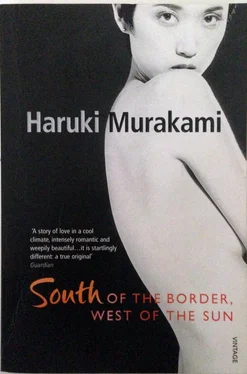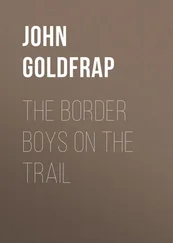I wanted to be alone, so knowing nothing else, I went swimming every morning at the pool. Then I’d go to my office, stare at the ceiling, and lose myself in daydreams of Shimamoto. With Yukiko’s question hanging before me unanswered, I was living in a void. I couldn’t go on forever like that. It just wasn’t right. As a human being, as a husband, as a father, I had to live up to my responsibilities. Yet as long as these illusions surrounded me, I was paralyzed. It was even worse whenever it rained, for then I was struck by the delusion that Shimamoto would show up: quietly opening the door, bringing with her the scent of rain. I could picture the smile on her face. When I said something wrong, she would silently shake her head, smiling all the while. All my words lost their strength and, like raindrops glued to the window, slowly parted company with reality. On rainy nights I could barely breathe. The rain twisted time and reality.
When I grew exhausted with these visions, I stared at the scenery outside. I was abandoned in a lifeless, dried-out land. Visions had drained color from the world. Everything, every scene before me, lay flat, mere makeshift. Every object was gritty, the color of sand. The parting words of my old high school classmate haunted me. Lots of different ways to live. And lots of different ways to die. But in the end … all that remains is a desert .
The following week, as if lying in wait, strange events ambushed me one after another. On Monday morning, for no special reason I recalled the envelope with one hundred thousand yen and decided to look for it Many years before, I’d put it in a drawer in the desk in my office, a locked drawer, second from the top. When I moved into the office, I put some other valuables together with the envelope in that drawer; other than occasionally checking to see that it was there, I never touched it. But now the envelope was gone. This was strange, uncanny even, for I had absolutely no memory of moving it I was absolutely certain of that Just to make sure, I pulled open the other drawers and checked them from top to bottom. No envelope.
I tried to remember when I’d last seen it I couldn’t pin down an exact date. It wasn’t all that long ago, but not so recently, either. A month ago, maybe two. Three at the most.
Bewildered, I sat down on my chair and stared at the drawer. Maybe someone had broken into the room, unlocked the drawer, and removed the envelope. That wasn’t likely, though–the drawer contained more cash and valuables, which were untouched. Yet it was within the realm of possibility. Or maybe unconsciously I’d disposed of the envelope and for whatever reason erased the memory from my mind. Okay, I told myself, what does it matter? I was going to get rid of it someday. I just saved myself the trouble, right?
But once I acknowledged that the envelope had disappeared, its existence and nonexistence traded places in my consciousness. A strange feeling, like vertigo, took hold of me. A conviction that the envelope had never actually existed swelled up inside me, violently chipping away at my mind, crushing and greedily devouring the certainty I’d had that the envelope was real .
Because memory and sensations are so uncertain, so biased, we always rely on a certain reality—call it an alternate reality—to prove the reality of events. To what extent facts we recognize as such really are as they seem, and to what extent these are facts merely because we label them as such, is an impossible distinction to draw. Therefore, in order to pin down reality as reality, we need another reality to relativize the first Yet that other reality requires a third reality to serve as its grounding. An endless chain is created within our consciousness, and it is the very maintenance of this chain that produces the sensation that we are actually here, that we ourselves exist But something can happen to sever that chain, and we are at a loss. What is real? Is reality on this side of the break in the chain? Or over there, on the other side?
What I felt at that point, then, was this kind of cut-off sensation. I closed the drawer, deciding to forget all about it I should have thrown that money away when I first got it Keeping it was a mistake.
On Wednesday afternoon of the same week, I was driving down Gaien Higashidori, when I spied a woman who resembled Shimamoto. She had on blue cotton pants, a beige raincoat, and white deck shoes. And she dragged one leg as she walked. As soon as I saw her, everything around me froze. A lump of air forced its way up from my chest to my throat Shimamoto , I thought I drove past her to check her out in the rearview mirror, but her face was hidden in the crowd. I slammed on my brakes, getting an earful of horn from the car behind me. The way the woman held herself, and the length of her hair—it was Shimamoto exactly. I wanted to stop the car right then and there, but all the parking spots along the road were full. Two hundred meters or so ahead, I finally found a place and managed to squeeze my car in, then I ran back to find her. But she was nowhere to be seen. I ran around like a lunatic She had a bad leg, so she couldn’t have gone too far, I told myself. Shoving people aside, jaywalking across streets, I ran up the pedestrian overpass and looked down on all the passersby below. My shirt was soaked with sweat Soon, though, a revelation dawned on me. She had been dragging the opposite leg. And Shimamoto’s leg was no longer bad .
I shook my head and sighed deeply. Something must be wrong with me. I felt dizzy, all my strength drained away. Leaning against the crosswalk signal, I stared at my feet for a while. The signal turned from green to red, from red to green again. People crossed the street, waited, crossed, with me immobile, collapsed against the post, gasping for breath.
Suddenly I looked up and saw Izumi’s face. Izumi was in a taxi stopped right in front of me. From the rear-seat window, she was staring right at me. The taxi had halted at the red light, and at most, three feet separated her face and mine. She was no longer the seventeen-year-old girl I used to know, but I recognized her at once. The girl I’d held in my arms twenty years before, the first girl I kissed. The girl who, on that fall afternoon so long ago, took off her clothes and lost the clasp to her gaiter belt People might change in twenty years’ time, but I knew this was her. Children are afraid of her , my old classmate said. When I’d heard that, I didn’t understand what he meant I couldn’t grasp what those words were attempting to convey. But now, with Izumi right before my eyes, I understood. Her face had nothing you could call an expression. No, that’s not an entirely accurate way of putting it I should put it this way: Like a room from which every last stick of furniture had been taken, anything you could possibly call an expression had been removed, leaving nothing behind. Not a trace of feeling grazed her face; it was like the bottom of a deep ocean, silent and dead. And with that utterly expressionless face, she was staring at me. At least I think she was looking at me. Her eyes were gazing straight ahead in my direction, yet her face showed me nothing. Or rather, what it showed was this: an infinite blank.
I stood there dumbfounded, speechless. Barely able to support my body, I breathed slowly. For a moment or two, my sense of self really did break down, its very outlines melting away into a thick, syrupy goo. Unconsciously I reached out my hand and touched the window of the cab, stroked the surface of the glass with my fingertips. I had no idea why. A couple of passersby, startled, stopped and stared. But I couldn’t help myself. Through the glass, I slowly stroked that faceless face. Izumi didn’t move a muscle or so much as blink. Was she dead? No, not dead. She was still alive, in an unblinking world. In a deep, silent world behind that pane of glass, she lived. And her lips, motionless, spoke of an infinite nothingness.
Читать дальше












